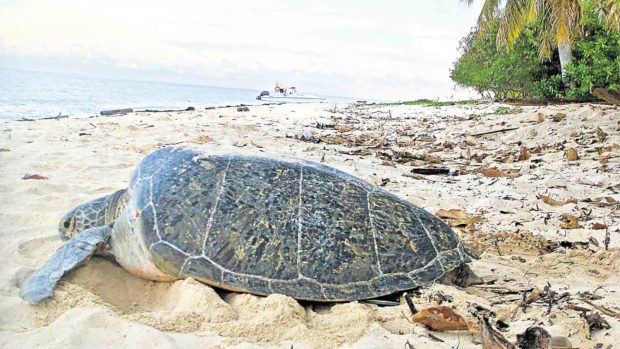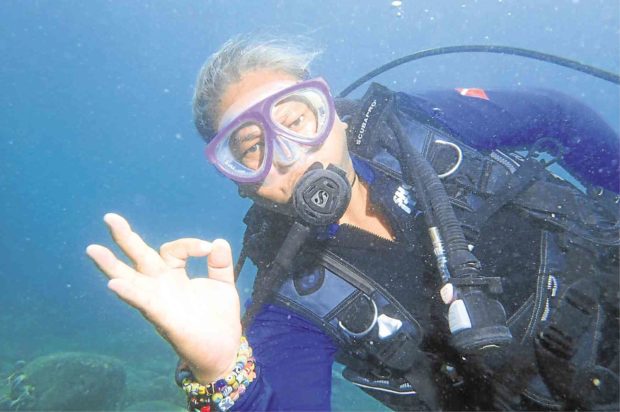
OUT OF HIS SHELL A marine turtle measuring at least a meter long and weighing more than 50 kilograms climbs up Baguan Island, a part of Turtle Islands in Tawi-Tawi province—and once the workplace of Romeo Trono. —CONTRIBUTED PHOTO/LETI BONIOL
MABINI, Batangas — Unlike the marine turtles that he had spent years studying, Romeo Trono has apparently never had slow days—even in retirement.
Contemplating the sunset by the beach while sipping rum mixed with Coke, Trono, 59, could easily be mistaken for a laid-back hippie, what with his long tousled hair and beaded bracelets.
His musings about life reinforce that impression.
“They say a man has to be able to do four things in life: sire a child to carry his name, plant a tree, build a home and write a book,” Trono said. “It makes me wonder when I’ll be able to do [the fourth],” he added.
But the man known in the marine conservation community as the “pawikan (marine turtle) expert” remains deeply committed to turtle conservation 36 years since he led a team of young biologists from the Department of Environment and Natural Resources (DENR) in the Pawikan Project on Baguan Island, part of the Turtle Islands in Tawi-Tawi province, Mindanao.
Turtle conservation was “unpopular” at the time, no thanks to very little scientific research available. Poaching was rampant and local government officials were on the take.
“[The job] was challenging,” Trono recalled. “Imagine [staying] on an island of 34 hectares with no electricity and no [means of] communication. We even had to catch our food ourselves.”
Who controls eggs?
At night, the team would go out to the nesting beach to study turtle species. They would harvest thousands of turtle eggs and take them to the hatchery to keep them safe from poachers, who usually found their way to Baguan during squalls.
Considered a delicacy in some cultures, the eggs were easily smuggled out of the country to Malaysia with the help of local fishermen.
“The most powerful person at that time controlled the turtle eggs, like the mayor. And so the threat was always there,” Trono said.
Thus did Trono spend 11 years of his life, sometimes being away from his Manila-based family for months.
25-year cycle
“I remember coming home and my young daughter could hardly recognize me,” he said.
A female sea turtle lays five to seven clutches of eggs per nesting season, with each clutch having about 100 eggs. The eggs are left to incubate in the sand while the female turtle swims back to foraging hot spots, spending years in the permanent feeding area before returning to the nesting beach. The whole cycle takes about 25 years, with 1 percent survival rate for the hatchlings.
It’s a long time to wait, Trono admitted. “If you were there [at the time], you’d probably ask, would I still be alive by then?”
But the team’s efforts paid off, as did the strict enforcement of laws protecting marine species which curbed poaching on Baguan.
From about 40 nesters a night, the number reached an average of 160 on Baguan alone, said Trono, adding that this resulted in half a million hatchlings a year.
Retirement
In 1993, Trono left the DENR to become country director for the World Wildlife Fund. He moved to Conservation International in 2003 and served as its country director for nine years.
RETIREMENT MODE Trono, relaxing, in front of the family’s bed and breakfast in Mabini, Batangas. —CONTRIBUTED PHOTO
Through all those years, Turtle Islands remained in his portfolio.
But retirement beckoned and Trono soon found his way to the coastal town of Mabini in Batangas province, where he had built a beautiful eclectic home overlooking the sea.
The family started building the house in 2005 and later turned it into a bed and breakfast called “Bontoc in Batangas.” Trono’s wife, Ann, has roots in Mountain Province.
“I’ve fallen in love with the sea,” said Trono who, at 12, would tag along with his father, national scientist Dr. Gavino Trono, to a marine station at Puerto Galera in Oriental Mindoro to study seaweeds.
‘Why do I do this?’
Trono still takes on consultancy jobs in marine conservation. Currently, he helps in the conservation program of dugong, or sea cows, in Palawan province.
“There are still a lot of doubting Thomases in conservation, and a lot of frustrations,” said Trono. “At times I ask myself, why do I this?”
He answered the question himself: “But there are species that you really have to invest a lot of time [studying], and not just a year or so. If you’re serious about it, you’ve got to have a very deep commitment.”


